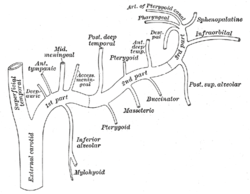The sphenopalatine artery (nasopalatine artery) is an artery of the head, commonly known as the artery of epistaxis.[1] It passes through the sphenopalatine foramen to reach the nasal cavity. It is the main artery of the nasal cavity.[2]
| Sphenopalatine artery | |
|---|---|
 Plan of branches of internal maxillary artery. (Sphenopalatine visible in upper right.) | |
| Details | |
| Source | Maxillary artery |
| Branches | Posterior lateral nasal branches posterior septal branches |
| Supplies | Frontal, maxillary, ethmoidal, and sphenoidal sinuses |
| Identifiers | |
| Latin | arteria sphenopalatina |
| TA98 | A12.2.05.088 |
| TA2 | 4460 |
| FMA | 49804 |
| Anatomical terminology | |
Course
editThe sphenopalatine artery is a branch of the maxillary artery which passes through the sphenopalatine foramen into the cavity of the nose, at the back part of the superior meatus. Here it gives off its posterior lateral nasal branches.
Crossing the under surface of the sphenoid, the sphenopalatine artery ends on the nasal septum as the posterior septal branches. Here it will anastomose with the branches of the greater palatine artery.
Clinical significance
editThe sphenopalatine artery is the artery commonly responsible for epistaxis (difficult to control bleeding of the nasal cavity, especially the posterior nasal cavity).[3] In severe nose bleed cases which do not stop after intense packing of anti-clotting agents, the sphenopalatine artery can be ligated (clipped and then cut) during open surgery or embolized (blocked with surgical glue or tiny microparticles).[4] Embolization is typically done under fluoroscopic guidance with minimally invasive techniques (e.g. via small microcatheters inserted into arteries in the wrist or groin) by interventional radiologists.
See also
editReferences
editThis article incorporates text in the public domain from page 562 of the 20th edition of Gray's Anatomy (1918)
External links
edit- lesson4 at The Anatomy Lesson by Wesley Norman (Georgetown University) (infratempfossaart)
- lesson9 at The Anatomy Lesson by Wesley Norman (Georgetown University) (nasalseptumart)
Notes
edit- ^ Dr.Padampreet Singh Batra’s ENT, Head and Neck » Blog Archive » Epistaxis (NASAL BLEEDING)
- ^ Sinnatamby, Chummy S. (2011). Last's Anatomy (12th ed.). Elsevier Australia. p. 364. ISBN 978-0-7295-3752-0.
- ^ Gras-Cabrerizo, JR; Ademá-Alcover, JM; Gras-Albert, JR; Kolanczak, K; Montserrat-Gili, JR; Mirapeix-Lucas, R; Del Campo, FS; Massegur-Solench, H (July 2014). "Anatomical and surgical study of the sphenopalatine artery branches". European Archives of Oto-rhino-laryngology. 271 (7): 1947–51. doi:10.1007/s00405-013-2825-1. PMID 24253386.
- ^ Robinson, Anthony E; McAuliffe, William; Phillips, Timothy J; Phatouros, Constantine C; Singh, Tejinder P (December 2017). "Embolization for the treatment of intractable epistaxis: 12 month outcomes in a two centre case series". The British Journal of Radiology. 90 (1080): 20170472. doi:10.1259/bjr.20170472. PMC 6047638. PMID 28972795.